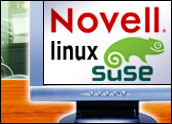
Novell is touting its inclusion of Xen server virtualization software in its new Suse Linux Enterprise 10, calling the open source virtualization technology from XenSource one of the most important features of its latest Linux platform.
Novell, which also released updated enterprise desktop and server software as part of its Suse Linux Enterprise 10 rollout, said it would show off the platform’s capabilities at the upcoming August LinuxWorld conference in San Francisco. IBM also bolstered the Xen move by announcing hardware and middleware support for Suse Linux Enterprise 10 and Xen.
Novell claimed significant demand for Xen virtualization from customers, but some industry observers questioned whether Xen was ready for inclusion in a Suse Enterprise Linux release, as such rollouts are known for providing tested, verified, enterprise-ready software.
“The thing with Xen is, it’s certainly going to be important technology for Linux users, but one of the things I do think, frankly, is somewhat troubling with the inclusion of Xen in Suse Linux Enterprise is that, by all accounts and some hands-on experience, this still seems like a fairly new product,” Illuminata Senior Analyst Gordon Haff told LinuxInsider. “It runs counter somewhat to [Novell’s] philosophy to include Xen at this time.”
We Want Xen
Nevertheless, Novell is looking to fight for Linux server market share, held mainly by rival Red Hat, and believes the virtualization wave has room for both VMware, the current popular choice for data center virtualization, and the open source Xen, which allows multiple operating to run concurrently, Novell Director of Product Marketing Justin Steinman told LinuxInsider.
“Frankly, I’ve been really surprised by the demand for Xen virtualization,” he said. “The market demand for this is through the roof.”
Steinman added that Novell had contributed more code than any other Linux vendor to Xen, indicating the Novell input has centered on stability and making Xen enterprise ready.
“The reason we included it is very simple, our customers asked for it,” Steinman said. Novell is touting the Xen software as one of the three most important features of the latest Suse Linux Enterprise release, along with AppArmor monitoring and other management software.
Adopting Too Early?
The market rollout of Xen is likely to mirror development of the virtualization software in that it is open source, and made available over a fairly broad window of time, Illuminata’s Haff said.
He added while there is certainly interest in Xen, it remains largely a hypervisor, and most enterprise virtualization has occurred with VMware, Virtual Iron, or similar solutions from HP, IBM and others.
“I’m not sure this particular release [of Xen] at this time makes a huge difference because the real, true production deployments of Xen are still in the early stage and still somewhat bleeding edge,” Haff said.
Virtually Committed
Novell and IBM seem to believe Xen is ready for the enterprise, however, with both companies touting server utilization and connected cost savings from the open source virtualization technology.
“IBM is committed to Xen because we believe it is a powerful open source technology that will help accelerate a standard virtualization technology platform to enable high levels of simplicity across diverse platforms,” said IBM Vice President of Worldwide Linux and Open Source Scott Handy.
IBM said it would support Xen with its Virtualization Engine products on Intel and Opteron-based blade and other servers.
Strong Interest
With virtualization leader VMware’s success and the “huge uptake” of its software, other players are looking to cut out a piece of the virtualization pie for themselves, Interarbor Solutions Founder and Principal Analyst Dana Gardner told LinuxInsider.
Independent software vendors (ISVs) are also looking to leverage virtualization to reduce their own development costs by writing software to a virtualization layer that is independent of different platforms, such as Linux and Windows, Gardner added.
“Virtualization is very hot and is of great interest to many operational and efficiency-minded people,” Gardner said. “Being able to do virtualization with open source through a lower-cost distribution model is of interest as well. It could be a big winner for Novell, which is in need of growth.”


















































